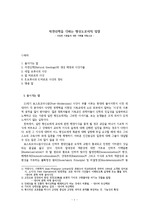

PARTNER
검증된 파트너 제휴사 자료
토마스 아퀴나스의 자연법과 정의 사상 - 그의 법사상의 신학적·철학적 기초와 관련하여 - (The Thomas Aquinas’ Thought of Natural Law and justice - Theological and philosophical basics of the his thought of law -)
36 페이지
최초등록일 2025.05.09
최종저작일
2014.09

-
미리보기
서지정보
· 발행기관 : 중앙법학회
· 수록지 정보 : 중앙법학 / 16권 / 3호 / 413 ~ 448페이지
· 저자명 : 신치재
초록
If it is the Godfathers who prepared the ground for the christian natural law, it is Thomas Aquinas who closely stipulated the natural law the most in the light of the reality of medieval times.
He is not only a theologian but also a philosopher who compiled medieval philosophy. In other words, he complemented “christian philosophy” which was settled into shape by Augustinus, and complied it.
Theological and philosophical basics of the principle of Thomas law is based not only on the Ten Commandments and the Law of Moses, especially about the trial in the Book of Deuteronomy, but also on medieval scholasticism founded on the Aristotelian philosophy and Stoicism of Rome, particularly Cicero’s principle of natural law.
Thomas’ theological thought is predicated on intellectualism. The natural law is generally an order in accordance with reason. Influenced by Stoicism, he claims that rationality is the sovereign principle of human beings.
A man is a rational animal moving toward one’s purpose with free will (conscience and responsibility). Political tendencies of unification and peace is inevitable for humans.
He divides the law into eternal law (Lex aerena), natural law (Lex naturale), a man-made law (Lex humana), divine law (Lex divina), and passional law (Lex fomes).
By faith, eternal law can be accepted as the guidance ideology of God’s action, which demonstrates God’s plan, and natural law can be found through natural judgements led solely by reason with the help of eternal law saying that a man is a rational creation of God. Also, a man-made law is the positive law enacted by human reason in order to sustain a social order in real life.
Believing in that God is present in the world, the Stoic school identifies divine law with natural law. However, the distinct characteristic of Thomas’ natural law is that he separates divine law as a law for afterlife from natural law as a law for this world.
More over, he doesn't argue that the contents of this life is transferred into the next world through harmonious stages. As natural law is mentioned in rationality of the nature, eternal law can be named by such involvement.
Thomas contends that any authoritarian state should have an ideal for justice via relative natural law in order to adhere to its own order and peace.
This ideal is realized at last when justice properly exchange and distribute everything given.
Thomas’ concept of justice is not connected with the strong rejection toward the course of justice, which is abused by authorities and used in distorted ways. In actual practice, demands for justice is just understood as a virtue that should be practiced by a complete object, a nation.
In conclusion, although Aquinas more strongly emphasizes pathos in justice than Stoics seeking natural law, he fails to stimulate interest in sharply contrasting the true meaning of law with the positive law. In this way, there is a difference with the modern theory of natural law.영어초록
If it is the Godfathers who prepared the ground for the christian natural law, it is Thomas Aquinas who closely stipulated the natural law the most in the light of the reality of medieval times.
He is not only a theologian but also a philosopher who compiled medieval philosophy. In other words, he complemented “christian philosophy” which was settled into shape by Augustinus, and complied it.
Theological and philosophical basics of the principle of Thomas law is based not only on the Ten Commandments and the Law of Moses, especially about the trial in the Book of Deuteronomy, but also on medieval scholasticism founded on the Aristotelian philosophy and Stoicism of Rome, particularly Cicero’s principle of natural law.
Thomas’ theological thought is predicated on intellectualism. The natural law is generally an order in accordance with reason. Influenced by Stoicism, he claims that rationality is the sovereign principle of human beings.
A man is a rational animal moving toward one’s purpose with free will (conscience and responsibility). Political tendencies of unification and peace is inevitable for humans.
He divides the law into eternal law (Lex aerena), natural law (Lex naturale), a man-made law (Lex humana), divine law (Lex divina), and passional law (Lex fomes).
By faith, eternal law can be accepted as the guidance ideology of God’s action, which demonstrates God’s plan, and natural law can be found through natural judgements led solely by reason with the help of eternal law saying that a man is a rational creation of God. Also, a man-made law is the positive law enacted by human reason in order to sustain a social order in real life.
Believing in that God is present in the world, the Stoic school identifies divine law with natural law. However, the distinct characteristic of Thomas’ natural law is that he separates divine law as a law for afterlife from natural law as a law for this world.
More over, he doesn't argue that the contents of this life is transferred into the next world through harmonious stages. As natural law is mentioned in rationality of the nature, eternal law can be named by such involvement.
Thomas contends that any authoritarian state should have an ideal for justice via relative natural law in order to adhere to its own order and peace.
This ideal is realized at last when justice properly exchange and distribute everything given.
Thomas’ concept of justice is not connected with the strong rejection toward the course of justice, which is abused by authorities and used in distorted ways. In actual practice, demands for justice is just understood as a virtue that should be practiced by a complete object, a nation.
In conclusion, although Aquinas more strongly emphasizes pathos in justice than Stoics seeking natural law, he fails to stimulate interest in sharply contrasting the true meaning of law with the positive law. In this way, there is a difference with the modern theory of natural law.참고자료
· 없음태그
-
자주묻는질문의 답변을 확인해 주세요

꼭 알아주세요
-
자료의 정보 및 내용의 진실성에 대하여 해피캠퍼스는 보증하지 않으며, 해당 정보 및 게시물 저작권과 기타 법적 책임은 자료 등록자에게 있습니다.
자료 및 게시물 내용의 불법적 이용, 무단 전재∙배포는 금지되어 있습니다.
저작권침해, 명예훼손 등 분쟁 요소 발견 시 고객센터의 저작권침해 신고센터를 이용해 주시기 바랍니다. -
해피캠퍼스는 구매자와 판매자 모두가 만족하는 서비스가 되도록 노력하고 있으며, 아래의 4가지 자료환불 조건을 꼭 확인해주시기 바랍니다.
파일오류 중복자료 저작권 없음 설명과 실제 내용 불일치 파일의 다운로드가 제대로 되지 않거나 파일형식에 맞는 프로그램으로 정상 작동하지 않는 경우 다른 자료와 70% 이상 내용이 일치하는 경우 (중복임을 확인할 수 있는 근거 필요함) 인터넷의 다른 사이트, 연구기관, 학교, 서적 등의 자료를 도용한 경우 자료의 설명과 실제 자료의 내용이 일치하지 않는 경우
“중앙법학”의 다른 논문도 확인해 보세요!
-
지방소득세에 있어서 외국납부세액공제제도의 문제점과 개선방안 42 페이지
Unlike foreign corporations and residents, domestic corporations and residents should pay taxes on worldwide incomes. Accordingly, a domestic corporation or resident should pay taxes not only to the s.. -
게임법의 구조와 체계 36 페이지
As understanding the game in context of game law, this paper starts from the seperation between play and game and arrives at the magic circle that is distinct area of game playing. Through analysis of.. -
판례로 본 민법 제108조 제2항의 제3자 범위 31 페이지
The thesis brings various cases of third parties interested based on those who made false expression and examines related precedents, leading to conclusion that it is more important to set the legal s..
찾으시던 자료가 아닌가요?
지금 보는 자료와 연관되어 있어요!
문서 초안을 생성해주는 EasyAI


